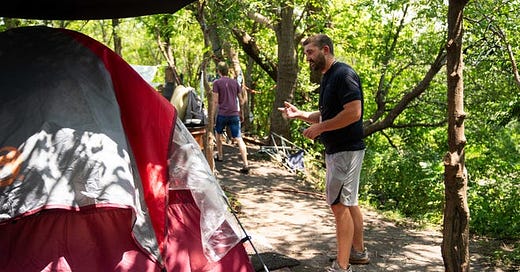Want an answer to increased homelessness? It's easy: Just outlaw it!
Or, instead of wasting money, we could invest it in what we know actually works
For every difficult social problem, our society leans on an easy solution: Let the criminal justice system deal with it.
I’ve written about two issues that fall in the laps of law enforcement and the courts: chronic school absenteeism and economic insecurity. There are so many more. Inadequate mental health care? Check. Substance use and addiction disorders? Check.
The solution du jour for one particularly thorny problem — homelessness — is to pass laws outlawing it. Think about that. Do we really believe that’s a recipe for success?
In fact, ticketing or jailing people and sweeping camps can deepen the cycle of homelessness, according to research cited by the National Alliance to End Homelessness. Enforcement is ineffective and expensive and does little to improve public safety, the group argues.
Since the U.S. Supreme Court’s ruling in City of Grants Pass v. Johnson in June 2024, more than 160 cities have passed new laws criminalizing homelessness, according to the National Homelessness Law Center. That includes Des Moines, which passed an ordinance banning camping on public property and another that shortens the notice requirement to remove encampments from 10 days to three.
First of all, such laws perpetuate a myth that most people sleep outside because they want to, said Claire Herbert, associate professor of sociology at the University of Oregon. Herbert spoke at an online panel discussion convened this month by the Institute for Innovation in Prosecution at John Jay College of Criminal Justice.
Often, people don’t have a choice. Shelter space is sparse, or they believe it’s unhealthy or unsafe. Rules may prevent them from staying with partners or pets or bringing possessions, and many shelters require sobriety.
“It’s not about people wanting to be homeless, it’s about the services not fitting their needs,” Herbert said.
Please remember Alyssa Mayer, a 20-year-old woman who struggled with methamphetamine addiction and homelessness and was killed in Des Moines in November 2023 days after being released from jail. Her family said she chose living in a tent because of the rape, robbery, and abuse she suffered in a shelter.
“Women use meth to stay awake at night so they are not victimized,” Herbert said.
Others on the streets may be escaping domestic violence and have nowhere else to go, said Niya Kelly, state legislative director for the Chicago Coalition for the Homeless and nother panel participant.
“We are telling survivors that if you want to sleep in a car for two hours, we will ticket you,” she said.
Supporters of such laws argue that enforcement can get people the help they need. Research says otherwise. When camps are torn down, people lose their possessions, including medication and their IDs. They’re pushed into more dangerous and isolated areas, where it’s harder for social workers to find them. Herbert cites examples of people who are near the top of the list for housing assistance, but after their tent is dismantled, they cannot be found.
Fining people who have little money is “pointless. It’s the height of stupidity,” said Mike Schmidt, former district attorney in Multnomah County, Ore. The problem comes when that person gets a job and is looking for a place to live.
“When they get back on their feet, the fines come back to hit them,” Schmidt said in the webinar. “I’ve seen it over and over again. It’s just frustrating. The punishment doesn’t happen when they’re homeless, it happens when they’re successful.”
So what are the solutions to homelessness? We already know this: More affordable housing, especially those with supportive services to help people address barriers such as unemployment, mental illness, addiction, disabilities, or other health conditions. Nationally, there’s an estimated 7.3 million shortage of affordable housing units.
Our collective failure to address this issue — coupled with low wages — has led to an increase in homelessness.
“We have not a federal response to meet the unmet need,” said Donald Whitehead Jr., executive director for the National Coalition for the Homeless.
The panelists urged prosecutors to speak out against the anti-homelessness laws. My boss, Polk County Attorney Kimberly Graham, has done so, urging the Des Moines City Council to reconsider its ordinances for many of the reasons I’ve discussed. (Because these are city ordinances, not state laws, our office does not prosecute these violations.)
To their credit, after a public outcry, Des Moines city officials addressed some of the concerns. This included providing outreach workers to help unhoused people, working with shelter operators to reduce barriers to emergency use, sheltering pets of unhoused people, and identifying storage options for personal possessions. Des Moines and Polk County have also put a few million dollars into a plan to purchase the downtown Holiday Inn to create supportive housing.

Yet the impetus to pass such laws continues. The Iowa Legislature considered draconian bills this year that would establish “unauthorized use of public land” as a simple misdemeanor (which carries a fine ranging from $105 to $855 and possible jail time). It also would create “drug-free homeless services zones” with criminal penalties for both drug users as well as shelter operators. The bills died.
I appreciate the sincere concerns of those searching for an answer to increased homelessness. I also understand those who want something done about crime harming our quality of life and downtown vitality. But we already have laws to address many of those offenses. Littering? Check. Trespass? Check. Public urination and defecation? Check. Open drug use? Check.
Let’s try what we haven’t done enough of, and what we know what works: A greater investment in housing and services to reduce homelessness, not perpetuate it.
“True Justice” is part of the Iowa Writers’ Collaborative. Check out the lineup of writers and consider subscribing.






You are right, Lynn. This was my work for 15+ years before coming to the ACLU of Iowa and it's now my work again - less so but some. Just house people. Period.
I am taken by many things said here but I’m focusing, for a minute, on the thought that things like fines, etc, come at someone when they start to progress - keeping them desperate. I know this to be true based on other work I’ve been involved in.